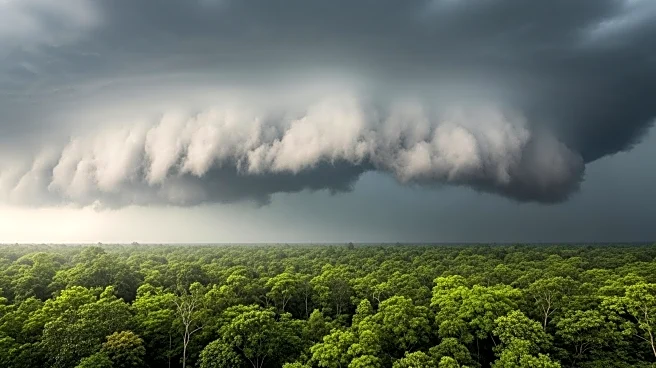What's Happening?
Recent research conducted by Arim Yoon at the Max Planck Institute for Meteorology has challenged previous assumptions about the climatic effects of deforestation in the Amazon rainforest. Utilizing advanced climate models, the study suggests that complete deforestation will not simply dry out the region but will lead to more varied and extreme weather conditions. The findings indicate that while annual mean rainfall may remain stable, the region will experience more frequent dry spells and a significant increase in extreme rainfall events, defined as over 50 millimeters of rain per hour. Additionally, temperatures are expected to rise, with daily minimum and maximum temperatures increasing by 2.7°C and 5.4°C, respectively. Strong winds are also predicted to become more common, posing challenges to forest regrowth and increasing heat stress for the local population.
Why It's Important?
The implications of these findings are significant for the 30 million people living in the Amazon region, including 2.7 million Indigenous individuals. The predicted increase in extreme weather events could exacerbate existing challenges related to agriculture, infrastructure, and health. Rising temperatures and more frequent extreme rainfall could lead to crop failures, damage to homes and roads, and increased health risks due to heat stress. The study highlights the urgent need for sustainable land management practices and policies to mitigate the impacts of deforestation. Understanding these potential changes is crucial for developing strategies to protect both the environment and the communities that depend on it.
What's Next?
Further research is needed to validate these findings and explore the effects of partial deforestation, which is more aligned with current projections for the region. Scientists like Luis Cattelan from the University of Leeds emphasize the importance of understanding regional climate impacts to inform policy decisions. The study calls for more comprehensive models to assess the long-term consequences of deforestation and guide efforts to preserve the Amazon rainforest. Policymakers and environmental groups may use this information to advocate for stronger conservation measures and international cooperation to prevent further deforestation.
Beyond the Headlines
The study underscores the complex interplay between deforestation and climate change, highlighting the broader environmental and social consequences. It raises ethical questions about the responsibility of global stakeholders in preserving biodiversity and protecting vulnerable communities. The findings may influence international climate negotiations and drive efforts to integrate Indigenous knowledge and practices into conservation strategies. Long-term shifts in weather patterns could also impact global climate systems, emphasizing the Amazon's role as a critical component of Earth's ecological balance.










